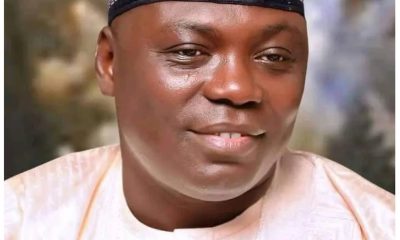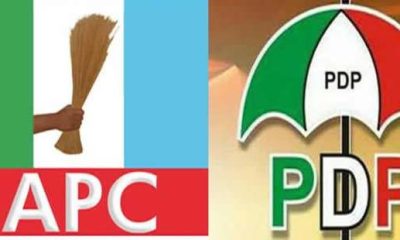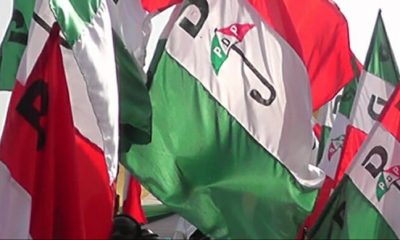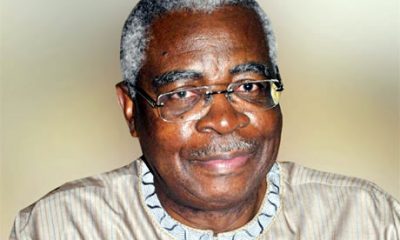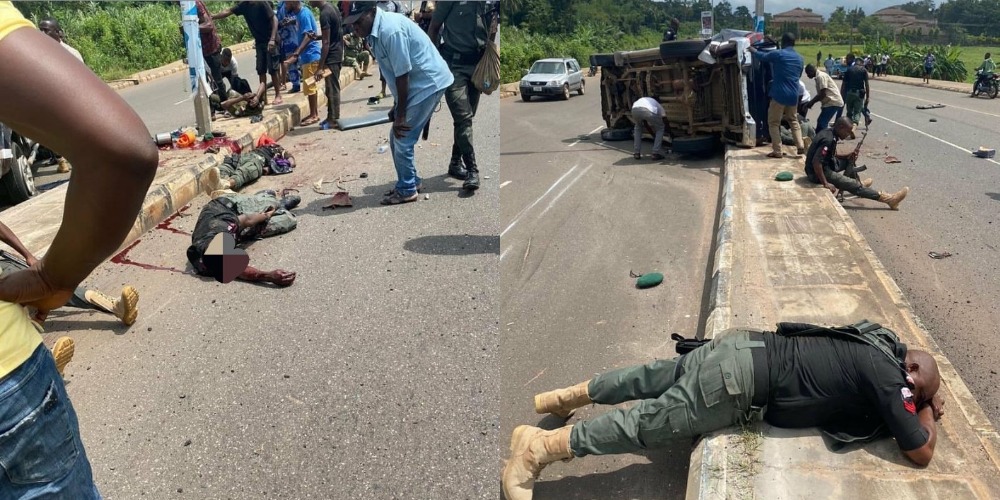OPINION
APC: The Limits of Propaganda

By Toby Okechukwu
On May 29, 2015, TheCable online newspaper catalogued the 81 promises with which the All Progressives Congress (APC) wooed Nigerians ahead of the 2015 presidential election. Nigerians were given postdated cheques that APC was ab initio aware would bounce.
However, time crystallizes everything. Had the APC not come to power, albeit on the strength of their “Change” propaganda, they would have probably remained the best government Nigeria never had. But today, they have unravelled. Evidently, APC was empanelled to capture power but lacked the capacity to govern. Virtually seven years after they grabbed power, Nigeria is at crossroads, as the ruling party has exhibited manifest contradictions in all facets of our life. Nigeria has become a laboratory of the absurd, experiencing chaotic and combustible economic, security, and social services conditions.
Perhaps, nothing exposes APC’s hypocrisy better than the chaotic energy situation sufficiently manifest in the multiple collapses of the national grid; disjointed subsidy regime evident in the import of toxic fuel and the interminable fuel queues across the country; the pyric rescue of a collapsed aviation sector by the national assembly; and the dysfunction of the railway sector where trains break down in the middle of nowhere, leaving stranded citizens at the mercy of marauding bandits.
From serially declaring fuel subsidy as “sheer fraud and corruption” before they came to power to ‘baptising’ it as under-recovery, the APC has presently made a volte-face on fuel subsidy removal, demanding over N3 trillion for the purpose to continue with the same “sheer fraud and corruption”. It is an evident lack of capacity by a government to confront the ghost of its deceptive past.
Prior to 2015, the APC claimed that 30 million litres daily fuel consumption during the Goodluck Jonathan administration was fraudulent, but under the APC government, Nigeria claims to consume over 100 million litres of fuel daily, with little or no certainty of statistics regarding Nigeria’s needs. Even after the minister of state for petroleum resources, Timipre Sylva, recently described it as “crazy figures”, the bazaar continues with the comedy of errors and corruption.
Nigerians will not forget in a hurry that the APC met the refineries working at what they admittedly described as “minimal capacity”. But we were meeting a bit of our daily needs. Today, they have run the refineries aground, completely. Not only have they been unable to fix the refineries for nearly seven years or build new ones as promised, but they have also jeopardized the chances of doing so. Despite awarding a contract of $1.5 billion in March 2021 (about N575 billion at the time) to fix the Port Harcourt Refinery, they are unable to deliver a litre of refined products. Yet the refineries recorded a whooping N10.27 billion in “operational expenses” in 2020 for producing nothing. And instead of fixing our refineries; instead of withdrawing subsidies to apply it to the capital development of the country and freeing us from loan burdens, they have destroyed our economy by throwing money at problems yet again.
Furthermore, the party that promised cohesion and new direction for Nigeria has been enmeshed in intractable crisis and unable to constitute, since inception in 2013, a board of trustees as stated by their party’s constitution. While the Independent National Electoral Commission (INEC) is issuing guidelines for the 2023 election, deservedly nicknamed the “All Progressives Confusion” by the prolific Mahmud Jega, is in crisis as always. Laden with caretaker committees, their attempts at organizing congresses have snowballed into numerous factional chairmen and multiple lawsuits in almost all the states. Unfortunately for Nigeria, it is this interminable crisis that they have constantly imported into our national life. They have been unable to manage themselves, let alone manage a vast nation like Nigeria.
There is complete disarticulation in their government marked by flip-flops on policies. Citizens have been treated to theatres of the absurd, as government functionaries engage themselves in street fights – governors against governors, ministers against ministers, cabals against cabals, leaders against leaders while government agencies drag one another to court. Nigeria has never had it this bad.
Even long after the APC would have been gone, Nigerians will live with their stockpiled debts, which are never borrowed based on any reliable projected direction, but on an ad hoc arrangement. Nigeria’s debt stock has shut up from N12.1 trillion inherited by President Muhammadu Buhari’s administration on May 29, 2015, to N38.005 trillion by the end of September 2021. A whopping N2.540 trillion of the debt burden was recorded between June and September 2021 alone. According to FG’s National Development Plan 2021-2025, the federal government hopes to push its public debt stock to N50.22 trillion by 2023, with domestic debt standing at N28.75 trillion and external debt at N21.47 trillion. Only recently, the minister of transportation, Rotimi Amaechi, blamed the delay in completing some major projects, including railway projects on the paucity of funds occasioned by the stoppage of funding by China. “We are stuck with lots of our projects because we cannot get money. The Chinese are no longer funding. So, we are now pursuing money in Europe”. Who would blame China?
APC constitutes a clear and present danger to the Nigerian economy, as no sector of the country is working. Their economic strategy appears to be limited to borrowing and taxing citizens and businesses to death. Just before ex-President Jonathan handed over, Nigeria was Africa’s biggest economy, the country was equally projected by CNNMoney to be the third fastest-growing economy in the world after China and Qatar. But in May 2016, about a year after they captured power, the National Bureau of Statistics reported that the Nigerian economy had shrunk to its lowest in 25 years. While Zenith Bank, FCMB, and Ecobank laid off 1,200 staff, 700 staff, and 50% of its top management staff, respectively within a year of APC coming to power, the Abuja Chamber of Commerce reported that over 50,000 Nigerians had lost their jobs in Abuja alone.
The job losses have since worsened. Rather than blame the divestments from Nigeria by notable multinational businesses on government’s impulsive policies, reckless statements and de-marketing of Nigeria by the President himself, the needless six-month delay in constituting a cabinet, thoughtless policies on foreign exchange that triggered a panic in the system, the APC were busy blaming their ineptitude on 16 years of the PDP.
Even the promissory note of $1 to N1 exchange advanced to Nigeria during the 2015 campaigns has metamorphosed to $1 to nearly N600. In addition, while the APC is busy celebrating wood-inflated rice pyramids, Nigerians are piling away in hunger and destitution, ejected from their farms by insecurity. They closed the borders for over a year for no good reason, and reopened it for no reason, as they achieved nothing. Smuggling thrives and our borders have never been this leaky, while cross-border crimes and arms importation going on arbitrarily and unchecked.
Even worse, the APC for the past six years has been operating a government of revenge. They are not building national unity nor are they interested in the profitable management of our diversities. They have weaponised government against their own citizens to the point that for the first time in our history, all the geopolitical zones are simultaneously engulfed in one major crisis or the other: Boko Haram in the north-east, banditry and terrorism in the north-west and north-central; kidnapping, ritual killings, abductions, and separatist movements in the south-west; separatism, restiveness, and sit-at-home in the south-east.
In a report released in February 2022, SBM Intelligence, a socioeconomic research firm, put media-reported killings in Nigeria in the last quarter of 2021 at 2,085 persons. This figure, according to SMB Intelligence, brings to 10,366 the number of persons killed in violent incidents, including attacks from Boko Haram, militia herdsmen, abductions, gang clashes and terrorists in 2021. The 10,366 deaths represent a 47% increase in media reported killings when compared to 7,063 fatalities in 2020 to 10,366 in 2021. Add the downing of Nigeria’s fighter jets in the north-west and the “missing” fighter jet in Borno state in 2021, the mass kidnappings, the control and governance of parts of Nigerian spaces by insurgents and bandits, and the number of schools either destroyed or closed due to the activities of uninhibited criminal cartels, then it can be unarguably be concluded that the APC has plunged a whole country into the ocean like a drunk pilot. You would wonder where all the billions of dollars approved for arms purchase and security for the government have gone to.
Meanwhile, it is in this government that the auditor-general of the federation is reporting that 178,459 arms and ammunitions are missing, among them over 88,078 AK-47 rifles and 3,907 assorted rifles and pistols from the police armoury. The essence of government comes within the realms of the Leviathan principle, which vests legitimate coercive powers in the government alone, while the people donate parts of their liberties to the state in exchange for protection. But the state’s monopoly of Leviathan or legitimate coercive power has been badly diminished and even compromised. In fact, the government is on ‘AWOL’. It is only such contradiction that will make a chief security officer of a state – the governor – negotiate with arms-slinging bandits.
It is noteworthy that Nigeria has faltered on Transparency International’s Corruption Perception Index for a second consecutive year. In the latest report (2021), Nigeria scored 24 out of 100 points, and ranked 154 out of 180 countries surveyed, thus slipping five places from the rank of 149 in 2020 placing as the second most corrupt country in West Africa. Nigeria had earlier dropped from 26th place in 2019 to 25th in the 2020 assessment.
It took the interventions of the house of representatives for the so-called palliatives and social interventions to get to a fraction of Nigerians. For the past six years, they have voted N500 billion annually for the poor. This comes to N3 trillion. But when directed by parliament to publish names of beneficiaries, they disingenuously claimed the beneficiaries would be unhappy to be identified by the public as poor.
OPINION
A silent Emergency: Soaring Costs of Diabetes Care Spark Alarm

By Folasade Akpan
For Mrs Schola Effiong, a 58-year-old confidential secretary in Calabar, managing diabetes in today’s economy feels like “climbing a hill that only gets steeper”.
Diagnosed in 2009, she said her monthly expenditure on insulin, tablets, laboratory tests and monitoring supplies now exceeds ₦150,000.
“You cannot stop taking the drugs, yet the cost keeps going up.
“Sometimes I do not have the money to buy some of them at the same time,” she said.
Her struggle mirrors the experiences of thousands of Nigerians at a time when experts warn that diabetes is becoming a major public health concern.
According to a 2018 national meta-analysis by Uloko et al.
, titled “Prevalence and Risk Factors for Diabetes Mellitus in Nigeria: A Systematic Review and Meta-Analysis”, Nigeria’s diabetes prevalence stands at 5.7 per cent, representing 11.2 million adults.The authors defined diabetes mellitus as a metabolic disorder of chronic hyperglycaemia caused by absolute or relative insulin deficiency and associated with disturbances in carbohydrate, protein and fat metabolism.
The study, which pooled data from numerous research works across the country, revealed wide regional disparities.
The prevalence rate was 3.0 per cent in the North-West, 5.9 per cent in the North-East, and 3.8 per cent in the North-Central, respectively.
The rates were higher in the southern part of the country: 5.5 per cent in the South-West, 4.6 per cent in the South-East, and 9.8 per cent in the South-South.
Experts say these patterns reflect changing lifestyles, rapid urbanisation and limited access to routine screening.
However, for many patients, statistics tell only a fraction of the real story.
Mr Offum Akung, a 57-year-old teacher in Cross River, said he had to ration his drugs because prices kept rising faster than his salary.
“I spend over ₦40,000 a month and still cannot buy everything on my prescription.
“I rely mostly on Glucophage now; when money allows, I add Neurovite Forte; diabetes management has become more difficult than the disease itself,” he said.
He appealed for government intervention, saying many patients were already “giving up”.
The Second Vice-President of the Diabetes Association of Nigeria, Mr Bernard Enyia, said the economic situation had pushed many Nigerians with diabetes into dangerous coping methods.
He said that he once managed his condition with about ₦70,000 monthly, but currently spends more than ₦180,000.
“Insulin has become something you pray for, while some people are sharing doses or skipping injections.
“Once you break treatment, the complications come quickly.”
Enyia, who lost his job as a health worker in 2017 due to frequent hospital visits, described the emotional toll as immense.
“It affects your finances, your social life, your marriage — everything. Many Nigerians with diabetes are quietly drowning,” he said.
Globally, concerns are also rising.
The World Health Organisation (WHO) estimates that more than 24 million adults in Africa are living with diabetes, a figure projected to rise to 60 million by 2050.
Marking World Diabetes Day 2025, WHO Regional Director for Africa, Prof. Mohamed Janabi, warned that rising obesity, lifestyle changes and weak health systems were fueling an “unprecedented wave of diabetes” across the continent.
He urged governments to prioritise access to affordable insulin, diagnostics and long-term care.
More so, pharmacists say they are witnessing the crisis firsthand.
The Senior Vice-President, Advantage Health Africa, Mr Adewale Oladigbolu, said many patients were no longer able to maintain regular medication schedules.
“People buy drugs today and skip them tomorrow because they do not have money.
“With non-adherence, they never reach therapeutic goals.”
Oladigbolu, a Fellow of the Pharmaceutical Society of Nigeria, said that locally manufactured metformin remained in high demand due to affordability, but insulin-dependent patients faced the harshest burden.
He stressed that diabetes care extended far beyond drugs.
“You need glucometers, strips, blood pressure monitors and regular tests.
“In countries where insurance work, patients do not think about the cost; in Nigeria, they pay for everything out of pocket,” he said.
He called for diabetes care to be covered under health insurance to reduce the financial burden on patients.
President of the Diabetes Association of Nigeria, Prof. Ejiofor Ugwu, described the rising cost of treatment as “a national crisis hiding in plain sight.
He said insulin, which sold for about ₦3,500 four years ago, presently costs ₦18,000 to ₦22,000 per vial.
“Test strips that were ₦2,000 now sell for ₦14,000, while glucometers have risen from ₦5,000 to over ₦25,000.
“On average, a patient now needs between ₦100,000 and ₦120,000 every month. Imagine earning ₦50,000 and being asked to spend twice that on one illness.”
He warned that between half and two-thirds of Nigerians with diabetes remain undiagnosed.
“We are seeing more kidney failure, more limb amputations, more blindness.
“These are late presentations caused by delayed or inconsistent treatment.”
Ugwu urged the Federal Government to urgently subsidise essential anti-diabetic medications and remove taxes on their importation.
“Most of these drugs are produced outside the country.
“Once you add import duties and other charges, prices become unbearable; subsidies and tax waivers could drop costs by at least 30 per cent,” he said.
He also called for expansion of the National Health Insurance Authority (NHIA) to cover a wider range of anti-diabetic medicines, glucose meters and strips — none of which are currently covered.
For many Nigerians, however, the struggle continues daily.
Across households, clinics and pharmacies, the message is the same: as Nigeria’s diabetes prevalence rises and treatment costs soar, more patients are slipping through the cracks — some silently, others painfully — while waiting for meaningful intervention.
In all, stakeholders say diabetes is a national emergency; people are dying quietly because they cannot afford medicine; hence the urgent need for relevant authorities to make anti-diabetic medications accessible and affordable.(NAN)
| ReplyReply allForwardAdd reaction |
OPINION
Is Community Parenting Still Relevant?

By Dorcas Jonah
In the Nigerian culture, extended families and communities play a crucial role in care-giving, instilling values, and supporting the development of children.
This cultural heritage of community parenting emphasises shared responsibility in raising children.
But in contemporary Nigeria, this age-long practice is facing enormous challenges due to modernisation.
In scrutinising this trend, some parents are of the view that community parenting helps in instilling morals and curbing social vices among children and youths, while others believe it is outdated.
Some parents are of the belief that their children are their responsibility; so they do not tolerate others correcting their children.
By contrast, others say that community parenting, when done with good intentions, can help raise a better society.
Mr Peterson Bangyi, a community leader in Dutse Makaranta, said that community parenting was the bedrock of raising a child.
He said the adage: “it takes a village to raise a child”, remained a powerful principle in contemporary society.
According to him, by Nigeria’s cultural norms and values, a child is owned by everyone; therefore, the grandparents, aunts, uncles, and neighbours actively contribute to raising children.
“This approach fosters a sense of belonging and ensures children grow up with diverse role models.”
Bangyi said that the extended families practiced by more communities were the backbone of parenting.
“But modernisation has taken away this practice as most families do not want people to come close to their children,’’ he said.
Mrs Monica Umeh, a mother of two, emphasising on the importance of community parenting, said that it played significant role in shaping her upbringing as a child and young adult.
Umeh advised that when correcting other people’s children, it is essential to do so with love and good intentions, without any form of bitterness.
“I am a strong advocate of community parenting as long as it is done with love and good intentions.
“I believe no parent can single-handedly raise a child without the support of others,’’ he said.
Mr Temitope Awoyemi, a lecturer, said that community parenting was crucial and could not be over-emphasised.
He said that community parenting helped society in inculcating strong moral values in children and youths, adding that modern life could be isolating for parents.
Awoyemi said that strong community support networks had been shown to lower parental stress levels and promote a more optimistic approach to raising children.
“It also ensures that a child receives guidance and correction from various adults, providing a broader, more consistent moral and social baseline that might be missed by parents who are busy with work.
“Community parenting encourages collaborative, interdisciplinary support from various community members and agencies in addressing a child’s developmental needs comprehensively.
“It focuses on prevention of long-term problems and celebrating individual strengths,’’ he said.
Awoyemi said that as the society continued to evolve, community parenting could adapt to ensure children benefitted from both cultural roots and contemporary innovations.
Mr Fortune Ubong, a cultural enthusiast, attributed the increasing crime rate in Nigeria to lack of community parenting that had extended to schools, and government institutions.
According to him, community parenting remains the foundation of every child’s moral upbringing.
“Most parents are now focused on earning a living and improving their lifestyle, in the process abandoning their primary duty of molding and guiding their children; this is where community parenting plays a greater role,” he said.
However, Mrs Joy Okezia, a businesswoman, said that given the recent developments in the country, correcting a child should be the sole responsibility of their parents.
Okezia said that she preferred to correct her children herself as she knew them better than anyone else.
She also noted that with the rising insecurity in the country, intervening to correct a child could pose a significant risk to the person.
Mrs Ijeoma Osita, a civil servant, also shared Okezia’s view, saying that a child’s behaviour was shaped by their family upbringing.
She said that if a child was not taught to love and respect others at home, an outsider would have little impact in correcting such a child.
Osita emphasised that parents should in still in their children the values of love and respect regardless of their status or background.
According to her, a child brought up with good values is less likely to misbehave well.
She cited the Holy Bible, saying, that says: “Train up a child in the way they should go, and when they are old, they will not depart from it’’.
Osita said that community parenting remained a vital aspect of Nigerian culture, promoting shared responsibility and resilience among families.
He opined that while modernisation posed challenges, blending traditional practices with modern strategies offered a promising path forward.
Observers say robust community connections are linked to better social-emotional development, academic achievement, and overall well-being for children.
They say that in modern society, amidst the digital world, economic instability, and busy work schedules, parents face pressures, making community support systems fundamental.
All in all, stakeholders are of the view that combining traditional community parenting with modern childcare – integrating technology, play-based learning, and skill acquisition – will produce well-rounded children.(NAN)
FEATURES
Victor Okoli: The Young Nigerian Tech Founder Building Digital Bridge Between Africa and America

Victor Chukwunonso Okoli, founder of Vnox Technology Inc. (USA) and Vnox Limited (Nigeria), is steadily emerging as one of the most promising new voices in global travel-tech. His mission is clear: bridge the technological gap between Africa and the United States, redefine global travel systems, and empower a new generation of skilled youths through innovation-driven opportunities.
In a statement issued in Onitsha, Anambra State, by Vnox Limited (Nigeria), the company emphasized Okoli’s growing influence as a Nigerian international graduate student contributing meaningfully to U.
S. innovation. His rising travel-technology platform, FlyVnox, currently valued at an estimated $1.7 million, is positioning itself as a competitive player in the global travel ecosystem.Okoli explained that Vnox Technology was founded to “train, empower more youths, create global employment opportunities, and drive business growth through our coming B2B portal inside the FlyVnox app.” The platform’s new B2B system aims to support travel agencies, entrepreneurs, and businesses across Africa and the diaspora—giving them access to modern tools, previously inaccessible technologies, and global opportunities.
Several young men and women are already employed under the expanding Vnox group, with more expected to join as the brand grows internationally.
Born and raised in Eastern Nigeria, Okoli’s early life exposed him to the realities and frustrations faced by international travelers and diaspora communities. After moving to the United States for graduate studies, he transformed those experiences into a bold technological vision—building systems that connect continents and create seamless mobility for users worldwide.
At the center of that vision is the FlyVnox app, a modern airline-ticketing platform built with global users in mind. Combining American engineering precision with African mobility realities, FlyVnox offers international flight search, multi-currency support, secure payments, transparent pricing, and a clean, intuitive interface.
Beyond FlyVnox, Okoli has built a growing tech ecosystem under Vnox Technology Inc., which oversees several innovative ventures, including: Vnox TravelTech Solutions LLC (FlyVnox App), VnoxPay (fintech), VnoxShop / Zyrlia (e-commerce)
VnoxID / Nexora (digital identity and smart business card solutions)
Vnox Limited (Nigeria) anchors African operations, media services, and talent development—ensuring the brand remains rooted in its home continent even as it grows globally.
Okoli’s work has broad significance for both Africa and the United States. He represents the powerful impact of immigrant entrepreneurship on global competitiveness—creating new jobs, driving innovation, strengthening U.S.–Africa commercial ties, and contributing to the development of practical, scalable technologies.
The statement concludes that Vnox Technology is a brand to watch. As FlyVnox gains international traction and the Vnox group expands its footprint, Victor Okoli stands as a symbol of a rising generation: African-born, globally minded, and building technologies that connect and serve the world.

